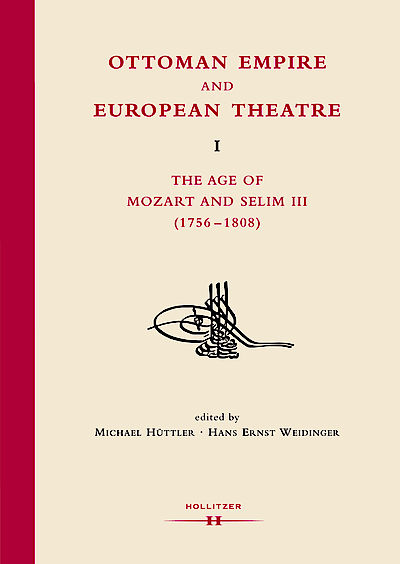
Michael Hüttler, Hans Ernst Weidinger (eds.): Ottoman Empire and European Theatre. Vol. I: The Age of Mozart and Selim III (1756-1808), Vienna: Hollitzer Verlag, 2013 (Ottomania 1), 1036 pages, 24 x 17 cm, hardcover with dust jacket
ISBN 978-3-99012-065-1 (hbk) € 82,50
ISBN 978-3-99012-067-5 (epub) € 49,99
ISBN 978-3-99012-066-8 (pdf) € 49,99
Ottoman Empire and European Theatre
Vol. I: The Age of Mozart and Selim III (1756-1808)
The first volume of the book series Ottoman Empire and European Theatre focuses on the period between 1756 and 1808, the era of W. A. Mozart (1756–1791) and Sultan Selim III (1761–1808).These historical personalities, whose life-spans overlap, were towering figures of their time: Mozart as an extraordinary composer and Selim III as both a politician and a composer.
Inspired by the structure of opera, the forty-four contributions of Volume I are arranged in eight sections, entitled Ouverture, Prologue, Acts I–V and Epilogue. The Ouverture includes the opening speeches of diplomats, politicians, and scholars as well as a memorial text for the “Genius of Opera”, Turkish prima donna Leyla Gencer (1928–2008). The Prologue, “The Stage of Politics”, features texts by distinguished historians who give an historical overview of the Ottoman Empire and Europe in the late eighteenth century, from both Turkish and Austrian points of view. Act I features texts concerning “Diplomacy and Theatre”, and Act II takes the reader to “Europe South, West and North”. Act III has contributions concerning theatre in “Central Europe”, while Act IV deals with “Mozart” and the world of the seraglio. Act V turns our attention to the Ottoman “Sultan Selim III”, and the Epilogue considers literary and theatrical adventures of “The Hero in the Sultan’s Harem”.
CONTENTS
Hans Ernst Weidinger (Vienna): Don Juan, Ottoman Empire and European Theatre: A Proem
Ouverture
Michael Hüttler (Vienna) and Hans Ernst Weidinger (Vienna/Florence): Editorial
Michael Hüttler (Vienna): Orientalism on Stage: Historical Approaches and Scholarly Reception
Opening Speeches – Symposium Vienna (April 25–26, 2008)
Programme
Helga Dostal (Vienna): UNESCO International Theatre Institute (ITI) – Austrian Centre
H. Exc. Selİm Yenel (Vienna): Ambassador of the Turkish Republic in Austria
H. Exc. Emil Brix (Vienna): Austrian Ministry of Foreign Affairs, Cultural Section
Opening Speeches – Symposium Istanbul (June 5–6, 2008)
Programme
Christian Brunmayr: Austrian Cultural Forum Istanbul
Cemal Öztaş (Ankara): Grand National Assembly of Turkey
H. Exc. Heidemaria Gürer (Ankara): Ambassadress of the Republic of Austria in Turkey
Academic Bass
Wolfgang Greisenegger (Vienna): University of Vienna
İlber Ortaylı (Istanbul): Topkapı palace Museum Istanbul
Metin And (Ankara): Turkish Academy of Sciences
Dedication to the Genius of Opera
Zeynep Oral (Istanbul): In Memoriam Leyla Gencer
Prologue: The Stage of Politics
Historical Overview
Bertrand Michael Buchmann (Vienna): Austria's Relations with the Ottoman Empire in the Eighteenth Century
Mehmet Alaaddin Yalçınkaya (Trabzon): The Ottoman Empire and Europe in the Wake of the Second Half of the Eigteenth Century
Act I: Diplomacy and Theatre
Earliest Performances
Suna Suner (Istanbul/Vienna): The Earliest Opera Performances in the Ottoman World and the Role of Diplomacy: A Remapping from the Fifteenth to the Twentieth Century
Walter Puchner (Athens): European Drama and Theatre in Seventeenth-Century Istanbul
Ambassadors and Envoys
B. Babür Turna (Ankara): The Watcher and the Watched: Eighteenth-Century Ottoman Diplomatic Visitors in Europe as Spectator and ‘Performer’
Günsel Renda (Istanbul): The European Ambassadors at the Ottoman Court: The Imperial Protocol in the Eighteenth Century
Frank Huss (Vienna): “Auf türkische Art prächtig aufgeputzt”: The Visit to Vienna by the Extraordinary Ottoman Envoy, Chaddi Mustafa Efendi, in the Year 1748
Jannissaries and Mehter – Turkish Military Music
William F. Parmentier II (Istanbul): The Mehter: Cultural Perceptions and Interpretations of Turkish Drum and Bugle Music Throughout History
Act II: Europe South, West and North
Milan, London and Vienna
Alexandre Lhâa (Aix-en-Provence): Performing ‘Turkish Rulers’ on the Teatro alla Scala’s Stage: From the Late Eighteenth to the Mid Nineteenth Century
Esin Akalin (Istanbul): The Ottoman Seraglio on European Stages
Emre Aracı (London): “Help for the Turk”: Investigating Ottoman Musical Representations in Britain from the Late Eighteenth to the Mid Nineteenth Century
Copenhagen and Paris
Bent Holm (Copenhagen): The Staging of the Turk: The Turk in the Danish Theatre of the Eighteenth Century
Isabelle Moindrot (Paris): The ‘Turk’ and the ‘Parisienne’: From Favart’s Soliman second, ou Les trois sultanes (1761) to Les Trois Sultanes (Pathé, 1912)
Act III: Central Europe
From Paris to Vienna
Thomas Betzwieser (Bayreuth): Ottoman Representation and Theatrical alla turca: Visiting an Unknown Viennese Source of ‘Turkish’ Incidental Music
Michael Hüttler (Vienna): ‘Turks’ on the Late Eighteenth Century’s Viennese Stage: A Research Project Based on the Viennese Repertoire
Matthias J. Pernerstorfer (Vienna): The Second Turkish Siege of Vienna (1683) Reflected in its First Centenary: ‘Anniversary Plays’ in the Pálffy Theatre Library, Vienna
From Vienna to Lwiv
Erich Duda (Vienna): Mozart’s Pupil and Friend: Franz Xaver Süssmayr’s Sinfonia Turchesca, Il Turco in Italia, and Soliman der Zweite
Gabriele C. Pfeiffer (Vienna): Freemason, Mozart’s Contemporary, and Theatre Director on the Edge: Franz Kratter (1758–1830) and Der Friede am Pruth (1799). Cataloguing the Komplex Mauerbach, Vienna
Act IV: Mozart
Mozart and ‘Turkishness’
Matthew Head (London): ‘In the Orient of Vienna’: Mozart’s ‘Turkish’ Music and the Theatrical Self
Marianne Tråvén (Uppsala): Getting Emotional: Mozart’s ‘Turkish’ Operas and the Emotive Aspect of Slavery
Serail Revisited
Derek Weber (Vienna): From Zaide to Die Entführung aus dem Serail: Mozart’s ‘Turkish’ Operas
Nadja Kayali (Vienna): Mozart’s ‘Orient’ on Stage
The Elegant Voyager to The City of The Sublime Porte
Annemarie Bönsch (Vienna): ‘Turkish’ and ‘Exotic’ References in the European Fashion of the Second Half of the Eighteenth Century
Selin İpek (Istanbul): European Influences on Eighteenth-Century Ottoman Imperial Fashion
Käthe Springer-Dissmann (Vienna): Mozart Goes to Constantinople! The Real Conditions of a Fictitious Journey
Act V: Sultan Selim III
In the Ottoman Empire 1756–1808
Tülay Artan (Istanbul): A Composite Universe: Arts and Society in Istanbul at the End of the Eighteenth Century
Caroline Herfert (Vienna): ‘German Poet and Turkish Diplomat’: Murad Efendi, Ottoman Consul in Temeswar, and the Tragedy Selim der Dritte
Sultan Selim III: A Man of Letters and Arts
Günsel Renda (Istanbul): Selim III as Patron of the Arts
Mustafa Fatih Salgar (Istanbul): Selim III as a Man of Letters and Art
Ayşın Candan (Istanbul): The Play World of Sultan Selim III
Epilogue
The Hero in the Sultan’s Harem
Ulrike Schneider (Weimar): Between Enlightenment and Orient: Oberon by Christoph Martin Wieland
Hans-Peter Kellner (Copenhagen): From The Prince of Denmark in the Sultan’s Harem to Don Juan in the Royal Danish Chambers: The Forgotten Composer Friedrich Ludwig Aemilius Kunzen (1761–1817)
Appendix
Picture Gallery
Index
Curricula Vita




